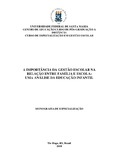| dc.contributor.advisor | Corrêa, Marcos Britto | |
| dc.creator | Carvalho, Vanessa Lorena Triches de | |
| dc.date.accessioned | 2019-02-05T11:49:55Z | |
| dc.date.available | 2019-02-05T11:49:55Z | |
| dc.date.issued | 2018-12-01 | |
| dc.date.submitted | 2018 | |
| dc.identifier.uri | http://repositorio.ufsm.br/handle/1/15549 | |
| dc.description | Monografia (especialização) - Universidade Federal de Santa Maria, Centro de Educação, Curso de Especialização em Gestão Educacional, EaD, RS, 2018. | por |
| dc.description.abstract | The present research analyzes the family participation in the school life of the students, especially the stage of early childhood education, forming a basis for the other stages. Its general objective is to reflect on aspects related to the relationship between family and school, highlighting the implications of this in the formation of the individual. As specific objectives, we tried to argue about the concept of childhood and its importance for the other stages of life; understand the historicity of what we now understand as Early Childhood Education; to analyze the meanings and values that the stage represents for the formation of the subjects; and, reflect on how School Management can contribute to the family's greater participation in school. The relevance of this research is justified by the fact that there is still a great difficulty of interaction between family and school. Therefore, it is necessary that efforts are directed to highlight this problem. Finally, the importance of the interaction between school and family is recognized, since the school alone can not assume the functions of teaching, which refer to formal education with the purpose of guaranteeing intellectual development through the teaching-learning process, and the education related to informal education, which occurs within the family, where the child learns mutual respect and coexistence with the rules demanded by society. In this way, the school has the role of reinforcing and adding, but never, to assuming the role of the family. | eng |
| dc.language | por | por |
| dc.publisher | Universidade Federal de Santa Maria | por |
| dc.rights | Acesso Aberto | por |
| dc.rights | Attribution-NonCommercial-NoDerivatives 4.0 International | * |
| dc.rights.uri | http://creativecommons.org/licenses/by-nc-nd/4.0/ | * |
| dc.subject | Família | por |
| dc.subject | Educação infantil | por |
| dc.subject | Gestão escolar | por |
| dc.subject | Participação | por |
| dc.subject | Family | eng |
| dc.subject | Child education | eng |
| dc.subject | School management | eng |
| dc.subject | Participation | eng |
| dc.title | A importância da gestão escolar na relação entre família e escola: uma análise da educação infantil | por |
| dc.title.alternative | The importance of school management in the relationship between family and school: an analysis of child education | eng |
| dc.type | Trabalho de Conclusão de Curso de Especialização | por |
| dc.degree.local | Polo de Tio Hugo, RS, Brasil | por |
| dc.degree.specialization | Gestão Educacional, EaD | por |
| dc.description.resumo | A presente pesquisa faz uma análise da participação da família na vida escolar dos estudantes, principalmente etapa da educação infantil, a qual é a base para as demais etapas. Tem como objetivo geral refletir sobre aspectos relativos à relação entre família e escola, ressaltando as implicações desta na formação do indivíduo na infância (educação infantil). Utilizou-se como objetivos específicos: argumentar sobre o conceito de infância e sua importância para as demais etapas da vida; compreender a historicidade daquilo que hoje compreendemos como Educação Infantil; analisar os sentidos e valores que a etapa representa para a formação dos sujeitos; e, refletir sobre como a Gestão Escolar pode contribuir para que a família participe mais da escola. A relevância desta pesquisa justifica-se em razão de se observar que ainda existe uma grande dificuldade de interação entre família e escola na educação infantil. Portanto, faz-se necessário que esforços sejam direcionados para evidenciar tal problemática. Por fim, reconhece-se a importância da interação entre a escola e família, pois sozinha a escola não consegue assumir as funções de ensinar, estas, que se referem à educação formal com o intuito de garantir o desenvolvimento intelectual através do processo de ensino-aprendizagem, e o educar referente à educação informal, esta, que ocorre no âmbito familiar, onde a criança aprende o respeito mútuo e a convivência com as regras exigidas pela sociedade. Desta forma, reconhece-se que a escola tem o papel de reforçar e acrescentar, mas nunca, de assumir o papel da família. | por |
| dc.publisher.country | Brasil | por |
| dc.publisher.initials | UFSM | por |
| dc.subject.cnpq | CNPQ::CIENCIAS HUMANAS::EDUCACAO | por |
| dc.publisher.unidade | Centro de Educação | por |



